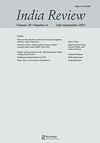Intergovernmental relations and the territorial management of ethnic diversity in India
IF 0.6
3区 社会学
Q3 AREA STUDIES
引用次数: 0
Abstract
ABSTRACT This article examines how and to what extent ethnic diversity underpinned intergovernmental relations (IGR) in deeply divided societies like India. Central to this is the vertical and intermediating roles of political actors, structures and processes of Indian federalism in defining the ways in which ethnic diversity is territorially managed. Unlike Canada or Belgium which have more formal and robust structures of IGR, the inconsequential roles of formal structures of IGR in India unduly leverage centralizing actors, structures and processes in the territorial management of ethnic diversity. Given that these centralizing actors, structures and processes are contingent on political expediency, the dynamic ideas, interests and strategies of centralizing and regionalist actors are particularly salient in defining not only the contours and outcomes of IGRs but also the ways in which “unity in diversity” are negotiated and balanced within the overarching framework of “self-rule and shared rule.”政府间关系和印度种族多样性的领土管理
本文探讨了种族多样性如何以及在多大程度上支撑着印度等分裂严重的社会中的政府间关系。其核心是政治行为者的纵向和中介作用,印度联邦制的结构和过程在确定种族多样性在领土上的管理方式。与加拿大或比利时不同,这些国家的IGR结构更加正式和强大,而印度的IGR正式结构的无关紧要的作用,在种族多样性的领土管理中过度地利用了集中的行动者、结构和过程。考虑到这些集权行为者、结构和进程取决于政治权宜之计,集权和地区主义行为者的动态思想、利益和战略不仅在定义igr的轮廓和结果方面,而且在“自治和共同统治”的总体框架内谈判和平衡“多样性中的统一”的方式方面尤为突出。
本文章由计算机程序翻译,如有差异,请以英文原文为准。
求助全文
约1分钟内获得全文
求助全文

 求助内容:
求助内容: 应助结果提醒方式:
应助结果提醒方式:


